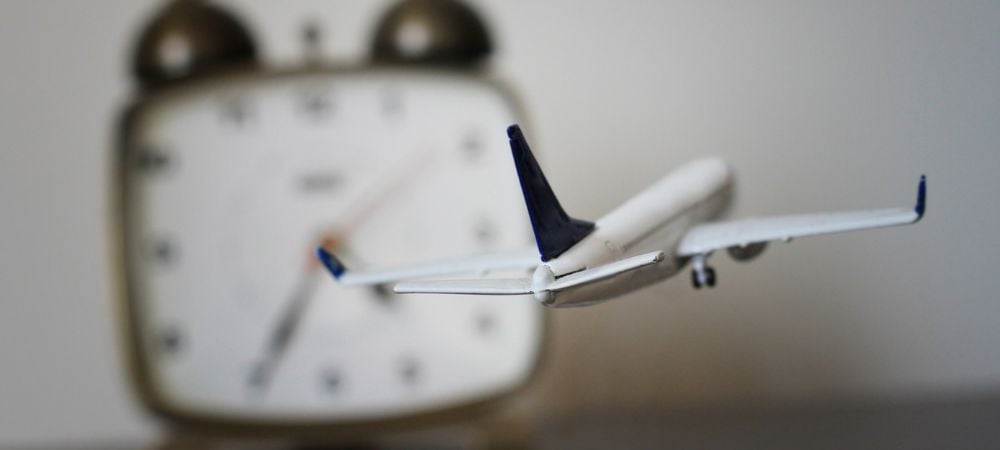Avoid Jet Lag: Tips & Treatments
Imagine this: You have been waiting to go on a trip you booked months ago. Now that the time is here, you have been packing your bags for weeks, making plans, and thinking of all the exciting experiences you’ll have there. But as you step on the plane and fly across various time zones, you find yourself struggling with jet lag – a common sleep problem many travelers frequently experience.
But fear not! We have your back. In this guide, we’ll discuss the various methods to avoid jet lag so that you can enjoy your travel without feeling exhausted.
What is Jet Lag?

Before looking into the various strategies you can use to avoid jet lag, let’s try to understand what it actually is!
If you are unfamiliar with circadian rhythm, you must have heard of your body’s internal clock. This rhythm regulates various psychological processes, including the sleep and wake cycle, hormone release, body temperature, and metabolism. When you travel across multiple time zones, this internal clock gets disturbed. It becomes out of sync with the time at your destination, leading to symptoms such as fatigue, insomnia, irritability, and difficulty concentrating. Hence, it is essential to prepare for jet lag and learn strategies to avoid it.
Symptoms of Jet lag:
Jet lag often comes with several symptoms, which include trouble sleeping, feeling tired during the day, and having a hard time thinking clearly and staying focused. Another symptom that people commonly experience is nausea and an upset stomach. Although these symptoms are not permanent, they can stick around for days.
Main Reason Behind Jet Lag:
Now, you must be wondering what the main reason behind jet lag is. The main reason for jet lag is the quick change in time zones, which disturbs the body’s sleep and wake cycle. It is important to note that our bodies rely on environmental factors such as light and darkness to regulate their functions. Sudden changes in time zones can confuse the body and incur jet lag.
Factors Influencing Jet Lag:
Factors such as the direction of travel and the number of zones you have crossed affect the intensity of jet lag. Traveling eastward usually leads to a stronger jet lag as the body adjusts to the earlier time zones. However, traveling westward causes milder symptoms.
Moreover, if you cross multiple time zones, you will experience intense jet lag, as your body’s internal clock will struggle to adjust to the significant changes in daylight hours.
How to Avoid Jet Lag?
Preparing for jet lag begins before you step foot on the plane. Here are some jet lag avoidance tips to make your trip more enjoyable.
- Adjusting to New Time Zones Before Departure:

One of the tips that works wonders is adjusting your schedule to the new time zone a few days before departure. Here is how you can do that:
- Start by gradually shifting your sleep schedule several days before departure.
- Go to sleep and wake up one hour earlier or later, depending on the direction of your travel.
- Adjust your mealtimes accordingly.
- Increase your exposure to natural light and decrease exposure to artificial light to help your body clock adjust to the new environment.
-
Managing Light Exposure:
Light exposure plays a major role in regulating circadian rhythms, so you must be mindful of your exposure to light before and during the flight. Try to get maximum exposure to natural light during the day to signal your body that it’s time to wake up. Moreover, limit the use of bright screens such as laptops and smartphones, especially in the evening and at night, to tell your body it’s time to rest.
If access to natural light is limited, try using apps like Entrain to stimulate natural light exposure.
Consider using products like Everki's Versa Briefcase or Atlas Wheeled Laptop Travel Backpack, offering convenient and organized solutions for carrying electronic devices while traveling.
Tips to Avoid Jet Lag During the Flight:
Read on to find out how to avoid jet lag during a flight.
1. Choosing the Right Flight Times:

Choosing a flight that aligns with your natural sleep patterns, such as overnight flights for long journeys, can help you minimize jet lag. Once you step foot on the flight, try to rest and relax as much as possible. Consider choosing flights that leave in the evening and reach your destination in the morning so that you can spend the maximum time sleeping on the flight. This will help your body better adjust to the new time zone. On the other hand, opting for a daytime flight can disrupt your sleep patterns and increase the chances of jet lag.
2. Create a Comfortable Environment for Yourself:
Create a comfortable environment for yourself with a neck pillow, eye mask, and noise-canceling headphones. Wear comfortable clothing and adjust your seat to a reclined position so that you can stay relaxed. Moreover, try not to drink caffeine or alcohol, as these can disturb your sleep pattern.
Choose backpacks with ample space for personal items, such as the Atlas Wheeled Laptop Backpack or Versa Premium Laptop Briefcase from Everki for a comfortable journey.
3. Drink Plenty of Water:

During your flight, avoid consuming alcohol and caffeine, as these can interfere with your sleep cycles. Drink plenty of water and try to stay hydrated during the flight, as dehydration can lead to intense jet lag symptoms. Stay hydrated and prioritize yourself!
Best Ways to Avoid Jet Lag: Some Natural Remedies and Ways
Natural Remedies can be helpful in combating jet lag and minimizing its symptoms, leading to better sleep during travel. Here are some natural remedies and ways that can be used to avoid jet lag.
1. Using Melatonin Supplements:
Melatonin, a hormone that regulates the sleep-wake cycle, can be taken in the form of supplements to help your body adjust to the new time zone. It is generally recommended to take between 0.5 – 5 mg of melatonin supplements 30 minutes or an hour before bedtime at your destination. It is usually advised to begin with a low dose and then gradually increase it according to your body's needs to avoid grogginess and other side effects.
Remember to consult a healthcare professional before taking any type of medication, especially if you have an underlying condition or are already using other medicines.
2. Ginger Tea for an Upset Stomach:
A common symptom of jet lag is an upset stomach, and Ginger tea can help with that. Ginger has natural anti-nauseous properties and can help reduce stomach discomfort. Drink ginger tea before and during your flight to make your journey more comfortable. Moreover, ginger tea is also known to be hydrating and can help with dehydration –another common symptom of jet lag.
3. Other Natural Remedies:
Other than melatonin and ginger tea, try:
- chamomile tea for relaxation
- lavender essential oil for stress relief
- and valerian root for better sleep
Try out different remedies, so you know which works best for you, and you can incorporate them into your travel routine for better results.
How Do You Avoid Jet Lag: Post Arrival Tips
When you have finally arrived at your destination, it is essential to take steps to help your body adjust to the new time zone and reduce the impact of jet lag. Here are some helpful travel tips to avoid jet lag for you:
1. Engage in Light Physical Activity:

Upon arrival, engaging in light physical activity can signal to your body that it is time to wake up. Light physical activity may include going for a walk, stretching, or riding a bike to get some fresh air and sunlight exposure. Staying active will help prevent feelings of lethargy and laziness and will also tell your body that it is time to be active.
2. Avoid Long Naps:
While you might want to take a nap or sleep after a long flight, especially if you are feeling lethargic and tired, it is best to resist the urge. Long naps can disturb your sleep schedule, making it harder for you to overcome jet lag. If you want, you can opt for a shorter power nap of 20 – 30 minutes. Consider setting up an alarm to make sure that you don’t oversleep.
3. Adjust Mealtimes:

Another helpful tip to avoid jet lag is adjusting your meal timings. Consider eating according to the local timings of your destination, even if you are not feeling hungry. This can also help reset your body clock and transition to a new sleep-wake schedule. Moreover, try avoiding heavy and rich food closer to your bed timings; this can help prevent digestive discomfort and improve your quality of sleep.
4. Stay Hydrated:
Staying hydrated is crucial in helping your body adjust to new time zones. Drink plenty of water throughout the day, especially if you are traveling to a destination with a warmer climate. Avoid caffeine and alcohol, as this can disturb your sleep cycle. However, go for water, herbal teas, and electrolyte-rich drinks to stay hydrated and support your body in adjusting to the new time zone.
Best Tips to Avoid Jet Lag for Children:
Jet lag can be particularly harsh for children, as their body clocks, i.e., circadian rhythms, are still developing, and they need a consistent sleep and wake schedule. Here are some tips for children to minimize the effects of jet lag and help them adjust to a new time zone.
1. Gradual Adjustments:
To reduce the effects of jet lag, eventually, adjust your child’s bedtime closer to the destination. Start adjusting bedtimes and wake-up times by 15-30 minutes every day.
2. Daylight Exposure:
Let your child play outside during daylight so that he gets the maximum exposure to natural light. Exposure to natural light signals to your body that it is time to stay up and active.
3. Limit Screen Time:
Moreover, don’t let your child use laptops or smartphones, as the artificial bright light can affect the production of melatonin hormone and consequently affect your child’s sleep patterns.
4. Have a Consistent Bedtime Routine:

Having a routine for bedtime can also help with jet lag. Activities such as reading books, taking a hot bath, or listening to calming music before bedtime can signal to your body that it is time to relax.
5. Maintain Healthy Eating Habits:
Encourage your child to eat meals and snacks that are nutritious; don’t let them eat sugary snacks or foods closer to bedtime, as they can disrupt sleep patterns. While having a healthy diet can regulate energy levels and increase the chances of a restful sleep.
How Can You Avoid Jet Lag: Tips for Frequent Travelers
Frequent travelers, especially business professionals, usually encounter jet lag, and they have to cross multiple time zones continuously. Here are some tips frequent travelers can use to minimize the effect of jet lag and stay on track with their busy schedules.
1. Scheduling Flights Strategically:
If it’s possible, choose flights strategically that allow you to sleep at your natural sleeping hours. The flight you choose should not disturb your sleep schedule and your body’s circadian rhythms. Red-eye flights or flights that let you sleep during your typical sleep hours can reduce the impact of jet lag.
2. Smart Packing:

Pack smartly, and ensure that your laptop bag for air travel has many compartments so you can put all of your electronic devices inside. Reduce your exposure to artificial bright light, which decreases the production of the sleep hormone – melatonin. When choosing a laptop bag for travel, look for various features such as padded compartments, checkpoint-friendly designs, and ample storage. Flight Briefcases from Everki have all of these features and are perfect for your long travels.
3. Create a Comfortable Environment:
As a business professional, we know that your life is demanding, requiring you to travel frequently. Hence, it is important for you to prioritize your comfort. Bring along items that will help you create a comfortable sleep environment for yourself, such as a travel pillow, noise-canceling headphones, and an eye mask.
4. Stay Hydrated:
Dehydration can increase the intensity of jet lag, so be sure to drink plenty of water before, during, and after your flight. Moreover, avoid excessive intake of caffeine or alcohol, as these can disturb your sleep pattern and further intensify your jet lag.
5. Give Yourself Time to Adjust:
Give your body the time it needs to adjust to the new time zone. Try not to schedule any important meetings on the first day so that your body gets the time it needs to settle in and adjust to the new time zone.
Conquer Jet Lag with Travel-Friendly Back Packs from Everki:
Jet lag is a challenge, and many travelers experience it while crossing the time zone. However, this challenge is manageable. Have a look at the tips and tricks we have shared and make your journey memorable. With this guide by your side, you are surely going to enjoy a comfortable and rejuvenating travel experience. All you need to do is plan ahead, rest and relax, and listen to your body’s needs.
Conquer Jet Lag on your next trip with Everki. Explore our wide range of travel-friendly laptop bags and accessories for a comfortable journey. We have got everything you need to travel in style and convenience.
FAQs
Q: How long does jet lag typically last?
A: The duration of the jet lag symptoms will depend on various factors, including the number of time zones traveled and individual differences in the body clock, i.e., circadian rhythm. In general, it can usually take several days to fully recover from all the symptoms of jet lag.
Q: Is it possible to entirely prevent jet lag?
A: Although it is not possible to entirely prevent jet lag, there are various steps you can take to minimize its effects and symptoms. To reduce the impact of jet lag, consider adjusting your sleep schedule, getting light exposure, staying hydrated, and maintaining healthy habits before, during, and after the flight.
Q: Are there any medicines that can help with jet lag?
A: Melatonin supplements are commonly used to regulate the sleep and wake cycle. However, it is important to consult your healthcare provider before taking any type of medication or supplements, especially if you have an already existing health condition or are using other medications.
Q: When is jet lag worse, when traveling west or when traveling east?
A: Jet lag tends to be worse when traveling eastward across various time zones. This is because traveling east disturbs the body’s internal clock more abruptly, making it harder to adjust to new time zones.
Q: Do people of different ages experience jet lag differently?
A: Yes, people of different ages experience jet lag differently. For example, adults and children may have different experiences with jet lag, as aging affects the body’s ability to regulate the sleep and wake cycle, making jet lag symptoms more prominent in adults. However, children may experience their own unique challenges to jet lag, requiring more time to adjust to different time zones compared to older adults.

